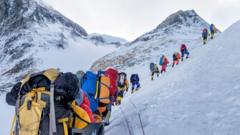Starting in September 2023, the cost to climb Mount Everest will rise dramatically, as Nepal's government implements a significant increase in permit fees for climbers. The new fee for those attempting to conquer the world's highest peak during the busy April to May season will now be set at $15,000, up from the previous rate of $11,000. This hike represents a 36% increase that has many in the climbing community expressing mixed reactions.
In addition to the increased peak season fees, climbers looking to ascend Everest outside of this peak window will also see their permit costs rise by the same percentage. Those attempting to scale the mountain from September to November will need to pay $7,500, while climbers from December to February will face a fee of $3,750.
permit fees are crucial for Nepal's economy, contributing over 4% to its GDP, primarily garnered from mountaineering and trekking activities. Despite this, experts in the mountaineering world often criticize the Nepalese government for allowing a high number of climbers on Everest, which leads to safety issues and environmental degradation. Approximately 300 climbing permits are issued yearly for the mountain.
Narayan Prasad Regmi, the director general of Nepal's Department of Tourism, indicated that the royalty fees had not seen a revision for a long period, which prompted the recent adjustments. However, he did not disclose how the additional revenue might be allocated.
Renowned British mountaineer Kenton Cool, who has reached Everest's summit 18 times, remarked that the permit fee increase was anticipated and would not deter most international climbers financially. He expressed hope that the additional funds generated by the hike would be utilized effectively.
In April 2024, Nepal's Supreme Court directed the government to reconsider the issuance of mountaineering permits for Everest and other peaks, emphasizing the need to respect the mountains' capacity to accommodate climbers. This order did not outline a specific maximum number but aimed to address potential overload on the routes.
Concerns surrounding overcrowded conditions on Everest have led to testimonies of climbers queuing dangerously during peak climbing times, prompting the Nepalese army to initiate annual cleanup operations aboard the mountain. These missions have reportedly collected 119 tonnes of waste, including 14 human bodies. It is estimated that around 200 bodies could still be resting on the mountain.
Nepal boasts eight of the world's 14 highest mountains, with Everest being the most famous. The latest fee adjustments have reignited discussions about responsible climbing practices and the preservation of the iconic peaks in the Himalayas.





















